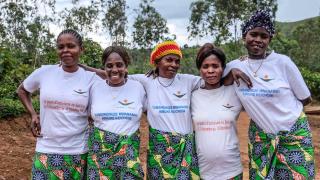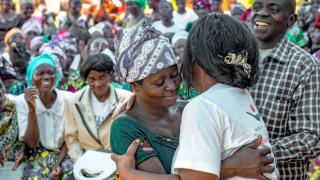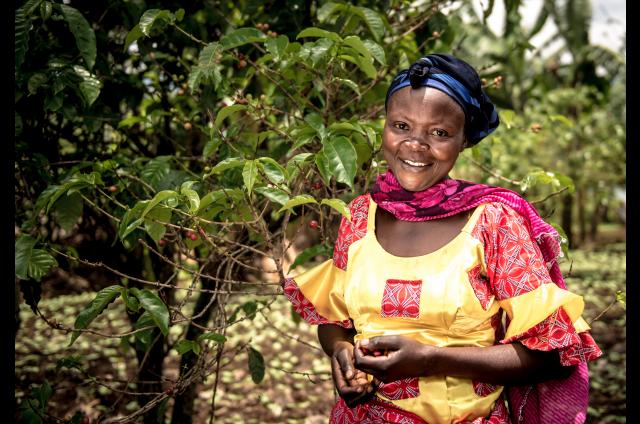Uplifting Women’s Futures: Proven Investments in Women in the DRC
What’s the key to knowing that your work has an impact on women’s lives? Research and evaluation.
Women living in eastern Democratic Republic of the Congo (DRC) are trapped in a complex web of ongoing conflict, instability, poverty, disease, and extreme gender discrimination.
Conflict has destabilised the communities women call home, hindering development, disrupting markets, limiting governance, and destroying assets while threatening women’s safety. Gender norms limit women’s income, access to education, ownership of assets, safety, agency, and power.
Since 2004, women in the DRC have transformed their lives and worked to overcome these barriers using knowledge, skills, and resources they’ve gained through the Women for Women International one-year programme.
We are pleased to share the results of our 24-month impact evaluation of our one-year programme in the DRC. Women who graduated from the programme had:
- Increased their savings, including a three-fold increase in their average personal savings, a doubling in the proportion of households with savings, and a doubling in average household savings. The gains in the household were driven by women’s own higher savings.
- Increased their access and usage of credit through participation in Village Savings and Loan Associations, where they had a source to access, use and benefit from credit.
- Increased their earnings, including 1.6 times higher weekly gross earnings and a shift from wage labour to entrepreneurship.
- Increased their assets, including gains in the value of household assets and in the percentage of women with legal control over land. Improved their health and well-being, including improved household diet diversity and decreased rates of anxiety.
- Increased agency and decision making, including feelings of more control over their own lives and increased participation in making decisions in their households.
- Increased social inclusion and networking, including increased participation in community groups and access to social support and an increase in women’s belief that women can lead in their communities.

The proven positive impact of the one-year programme in one of the toughest places to be a woman demonstrates the promise of using an integrated social and economic empowerment approach.
Achieving these results within the complex web of challenges facing women testifies to the importance of this programme model, especially for efforts to recover from the worldwide economic and health shocks caused by the COVID-19 crisis.
A local member of parliament at the research presentation in DRC shared:
I will share what you presented today with my fellow members of parliament and see how we can support women in rural areas.

Study details
In collaboration with researchers at the University of Washington, University of Texas at Austin, Marakuja Kivu Research, and the Innovative Hub for Research in Africa, our DRC team conducted a randomised controlled trial (RCT), the gold standard for rigorous evaluation.
An RCT has a control group: a group of participants who would be eligible for the one-year programme but don’t participate for the duration of the research study. Participants are randomised into groups for the study, ensuring the groups in the two study arms are comparable.
Researchers compared programme participants to women in the control group at three different points – before they enrolled into the programme, when they graduated, and one year after graduation – to see the effects of the programme.
They learned about women’s livelihoods, savings and assets, social empowerment, well-being, and social assets. Additionally, the research team examined whether having a spouse or male household member in the Men’s Engagement Programme impacted participants’ outcomes.
The results of this study help us understand where our programme is leading to significant positive changes for women participants and lay out an exciting roadmap for how we can continue to improve our work and deepen our impact.
Rigorous research plays an important role in learning what really works in supporting the most marginalised women to make long-term sustainable change in their lives, families and communities. Women for Women International builds on an existing foundation of strong evidence for its bundled approach, and this new research contributes to that growing body, so more people can work towards a more equitable reality.
In my community, we say that Women for Women International helps us get off the ground. I am a model to women; a teacher who educates other women to become respectful to everyone.
Hope Beyond the Headlines
Watch Laurie Adams (Women for Women International, CEO), Audry Shematsi (Country Director in the Democratic Republic of Congo), and Eva Noble (Associate Director, Research and Learning) discuss how the study findings show that an integrated social and economic empowerment programme can improve the lives of women impacted by war and conflict in eastern DRC.

